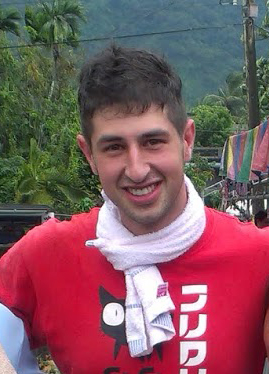“To me, wildlife conservation isn’t something that knows political boundaries because wild animals don’t know political boundaries.”
by Bonnie Eissner
 Since graduating from Adelphi, Scott Pursner ’05 has been living his dream of traveling and advocating for the environment. From 2012 to 2014, he pursued a Master of Science in Wildlife Conservation at Taiwan’s National Pingtung University of Science and Technology. Long interested in international wildlife conservation, Pursner has traveled on a long trajectory from his home in New Jersey to Adelphi, where he earned a B.A. in International Studies, to Taiwan. Along the way, he taught English in Japan, worked to revitalize endangered waterfowl populations in Alaska, studied the mating habits of satin bowerbirds in Australia and aided in the rehabilitation of raptors in Oregon. Although he had known from the age of 4 or 5 that he wanted to work with wildlife, he took seriously the guidance he received from mentors at Adelphi, including President Robert A. Scott, Ph.D., Senior Associate Provost for Academic Affairs Lester Baltimore, Ph.D., and Professor Marsha Darling, Ph.D., to spend time honing his passion before committing to graduate school.
Since graduating from Adelphi, Scott Pursner ’05 has been living his dream of traveling and advocating for the environment. From 2012 to 2014, he pursued a Master of Science in Wildlife Conservation at Taiwan’s National Pingtung University of Science and Technology. Long interested in international wildlife conservation, Pursner has traveled on a long trajectory from his home in New Jersey to Adelphi, where he earned a B.A. in International Studies, to Taiwan. Along the way, he taught English in Japan, worked to revitalize endangered waterfowl populations in Alaska, studied the mating habits of satin bowerbirds in Australia and aided in the rehabilitation of raptors in Oregon. Although he had known from the age of 4 or 5 that he wanted to work with wildlife, he took seriously the guidance he received from mentors at Adelphi, including President Robert A. Scott, Ph.D., Senior Associate Provost for Academic Affairs Lester Baltimore, Ph.D., and Professor Marsha Darling, Ph.D., to spend time honing his passion before committing to graduate school.
The diverse experiences ultimately gave Pursner a distinct sense of his goal: to devote his career to international wildlife conservation. “To me, wildlife conservation isn’t something that knows political boundaries because wild animals don’t know political boundaries,” he said.
He chose Asia as the focal point of his efforts. First, though, he needed to learn one of the continent’s major languages. He chose Mandarin, and with a scholarship from Taiwan’s Ministry of Education, headed to Taipei to study the language. He then decided to stay and pursue his master’s degree at a university in southern Taiwan. “It felt like the right time,” Pursner said. “I took a keen interest in the conservation work being done by the professors there.”
That research involved living and working with two indigenous groups—the Bunun and the Amis—in their respective villages to establish stronger ties and find new ways to collaborate in efforts to save endangered species, such as the pangolin.
Pursner pointed out that the Bunun people in Luanshan, who are largely agriculturalists or working in manual labor and struggling to provide for themselves in a region with little economic opportunity, care little about pangolin. Conservation is far from a primary concern.
Prior to Pursner’s arrival, the village had minimal influence in the conservation efforts. “It’s actually much better conservation if you have the village itself involved,” said Pursner. And he devoted his time to making that happen.
Ethan Chen, an English teacher in Taipei, is a friend of Pursner’s. This past summer, he traveled with Pursner to the States to see the university that had shaped him.
“There are many foreign students studying in Taiwan, and I’ve never seen one that is quite like him,” Chen said. He explained that most Taiwanese rarely venture into the country’s rugged southeastern region, thinking of it as “ just mountains and animals.” He added: “I have never seen a foreigner who cares about the environment in Taiwan that much…Also, he really just make(s) friends with the local people. He really cares about those folks in the mountains.”
Pursner hopes to stay on in Taiwan to conduct research and, further in the future, pursue a Ph.D.
His advice to aspiring conservationists is: “You have to will yourself to continue along your path. To work in this field, one needs to have passion and persistence—never forgetting why you are doing what you’re doing. Focus on building upon your previous experiences and never give in to those who try to deter you.”
For further information, please contact:
Todd Wilson
Strategic Communications Director
p – 516.237.8634
e – twilson@adelphi.edu